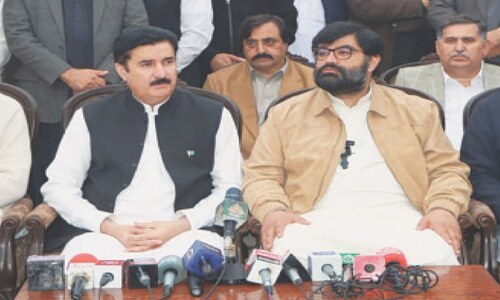PESHAWAR: Peshawar High Court Chief Justice Yahya Afridi on Tuesday said there would be no danger of any uprising or unrest in society if the people were provided with swift and timely justice.
He said this during the Secretariat of District Judiciary inauguration ceremony here at the Peshawar High Court.
The ceremony was attended by high court judges, representatives of the Multi-Donor Trust Fund (MDTF), British High Commission, UNDP, Swiss Embassy, German Development Bank, Governance and Policy Project (GPP) and relevant government officials.
The chief justice told the ceremony that the secretariat, whose establishment was funded by the World Bank, was meant to carve out an institution, which would be able to strengthen the administrative capacity of the district judiciary for quick and inexpensive judicial service delivery at the grassroots level.
Inaugurates Secretariat of District Judiciary at high court
He said the SDJ would provide citizens with the services to justice in a more efficient, transparent and speedy manner.
“The secretariat has different departments including ethics and integrity management, operation management (planning and development, administration and finance, and communication), service delivery monitoring and evaluation, and human resources and welfare,” he said.
The chief justice said it was high time that district judiciary be provided with an opportunity to determine its own career path and welfare.
“All this will ensure inexpensive and expeditious justice for all,” he said. The chief justice said the Peshawar High Court appreciated the support of the MDTF.
He said the high court was developing strategies in line with its priorities and that the support of donors would be welcomed in the reforms sector.
The chief justice informed participants that reforms had been introduced at the district judiciary to evolve a model for dealing with civil and criminal cases at the district level.
“We want to bring about changes, which should be spread from bottom up,” he said.
The chief justice said changes in the Civil Producer Code was mainly meant for the case flow management and execution.
He said the backing of the law was essential for introducing those reforms. The chief justice said the three days conference would be held in Feb on introducing changes to the Criminal Procedure Code, which would be attended by all stakeholders, including police and prosecution.
While talking about the concept of the CPC changes, he said the entire process took one year in which the feedback was taken from judicial officers, businessmen and people from all sectors.
The chief justice called for reforms and capacity building in the district judiciary.
“We have to increase the capacity of the district judiciary to dispense justice to the people,” he said.
The chief justice said eight far-flung districts had been selected to provide basic facilities to the people as currently, development was restricted to three districts only.
He suggested donors to prepare modules for training of judicial officers with the coordination of the judicial academy.
The chief justice said reforms in the district judiciary would provide oversight, compliance management, citizen facilitation and communication, grievance redress mechanism, integrity management, internal audit and analysis capability of district judiciary along scientific lines.
“The new system will be technology-driven where the monitoring and accessibility, research and development will make the lives of beneficiaries easier,” he said.
The chief justice called for the district judiciary to play a positive role for the success of the secretariat and judicial reforms.
He later distributed appreciation certificates to the GPP officers to acknowledge their support in the SDJ’s establishment.
At the end of the ceremony, the participants visited different sections of the high court and were briefed by the chief justice about the SDJ.
Published in Dawn, January 10th, 2018















































Dear visitor, the comments section is undergoing an overhaul and will return soon.